
REVISTA ESPANOLA DE CARDIOLOGIA
Scope & Guideline
Connecting Clinicians and Researchers in Cardiology
Introduction
Aims and Scopes
- Cardiovascular Disease Management:
The journal focuses on various aspects of cardiovascular disease management, including prevention, diagnosis, and treatment strategies across different patient populations. - Innovative Technologies in Cardiology:
It highlights studies involving new technologies, such as advanced imaging techniques, telemedicine, and artificial intelligence applications in cardiology. - Epidemiology and Public Health:
Research concerning the epidemiological trends of cardiovascular diseases and their public health implications is a core area, providing insights into risk factors and outcomes. - Heart Failure and Cardiomyopathies:
Significant emphasis is placed on heart failure, including its pathophysiology, management strategies, and outcomes in various subgroups of patients. - Interventional Cardiology:
The journal publishes studies on interventional techniques, including catheter-based procedures, surgical interventions, and their associated outcomes. - Genetics and Molecular Cardiology:
Research on the genetic basis of cardiovascular diseases is a unique contribution, exploring hereditary conditions and their implications for patient care. - Patient-Centric Research:
The focus on patient outcomes, quality of life, and individualized treatment approaches reflects the journal's commitment to patient-centered care.
Trending and Emerging
- Telemedicine and Remote Monitoring:
The rise of telemedicine, especially post-COVID-19, has led to increased research on remote patient monitoring technologies and their efficacy in managing cardiovascular conditions. - Artificial Intelligence in Cardiology:
AI applications in diagnostics, treatment planning, and patient management are gaining traction, with studies exploring their impact on clinical outcomes. - Heart Failure with Preserved Ejection Fraction (HFpEF):
Research focusing on HFpEF has surged, addressing its complexities and the need for targeted therapies to improve patient outcomes. - Multimodality Imaging Techniques:
There is an increasing emphasis on the use of multimodality imaging to enhance diagnostic accuracy and treatment planning for complex cardiovascular cases. - Cardiovascular Impact of COVID-19:
The pandemic has spurred significant research into the cardiovascular implications of COVID-19, including its effects on pre-existing conditions and outcomes. - Personalized Medicine and Genomics:
Emerging research on personalized approaches to cardiovascular treatment based on genetic profiling is becoming more prevalent, reflecting a shift towards tailored therapies. - Lifestyle Interventions for Cardiovascular Health:
An increased focus on lifestyle modifications, including diet and exercise, and their role in cardiovascular disease prevention and management is emerging as a key area of interest.
Declining or Waning
- Classic Cardiovascular Risk Factors:
Research specifically targeting traditional cardiovascular risk factors, such as hypertension and dyslipidemia, has become less prominent, possibly overshadowed by more complex interactions and newer risk markers. - Basic Science Research:
Papers focused solely on basic scientific research without direct clinical application have decreased, reflecting a trend towards more translational and applied research. - Surgical Techniques:
Although surgical interventions remain critical, there has been a relative decline in studies detailing classic surgical techniques, as interest shifts towards minimally invasive and catheter-based approaches. - Long-term Follow-up Studies:
There is a noticeable decrease in the publication of long-term follow-up studies, perhaps due to the increasing emphasis on immediate outcomes and technology-driven interventions. - Pharmacological Innovations:
Research focused solely on new pharmacological treatments without comprehensive studies on their clinical integration and impact appears to be waning.
Similar Journals
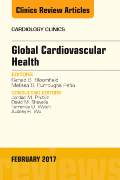
CARDIOLOGY CLINICS
Exploring the forefront of cardiovascular medicine since 1983.CARDIOLOGY CLINICS is a prestigious journal published by W B SAUNDERS CO-ELSEVIER INC, offering insightful and comprehensive reviews in the field of cardiology and cardiovascular medicine since its inception in 1983. With its ISSN 0733-8651 and E-ISSN 1558-2264, the journal has established a significant impact factor within the academic community, holding a Q2 ranking in both Cardiology and Cardiovascular Medicine as well as in Medicine (miscellaneous) for 2023. Located in the heart of Philadelphia, USA, it serves as a vital resource for researchers, clinicians, and students seeking to deepen their understanding of cardiovascular diseases and advancements in treatment. Although it operates under a traditional subscription model, the journal remains committed to disseminating valuable knowledge that shapes current practices and informs future research directions. As it converges towards its 2024 issues, CARDIOLOGY CLINICS continues to play an influential role in enhancing the discourse on cardiovascular health worldwide, ensuring that its audience stays at the forefront of clinical and scientific developments.
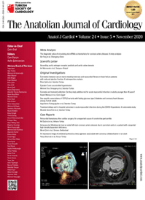
Anatolian Journal of Cardiology
Transforming Cardiology with Rigorous Research and Peer Review.The Anatolian Journal of Cardiology, published by KARE PUBL, stands as a vital resource in the field of Cardiology and Cardiovascular Medicine. With an ISSN of 2149-2263 and E-ISSN 2149-2271, this Open Access journal has been fostering the dissemination of critical research since 2001, ensuring that high-quality content is freely available to a global audience. Based in Turkey, the journal aims to bridge gaps in cardiological knowledge through rigorous peer-reviewed articles that span a wide range of topics, from innovative clinical practices to groundbreaking research findings. While its current ranking places it in the Q3 category of cardiology journals, the Anatolian Journal of Cardiology continues to strive towards enhancing its impact, currently holding a Scopus rank of 236 out of 387. Researchers, practitioners, and students alike will find this journal an essential platform for keeping abreast of the latest developments in cardiovascular health.
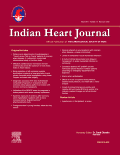
Indian Heart Journal
Unveiling the Future of Heart Health ResearchIndian Heart Journal, published by Elsevier, is a distinguished peer-reviewed journal dedicated to the field of cardiology and cardiovascular medicine. Founded in 1961, this journal has been a pivotal resource for researchers, healthcare professionals, and students, providing a platform for innovative studies and insights into heart health. The journal transitioned to an Open Access model in 2013, ensuring widespread dissemination of vital research findings to enhance global understanding of cardiovascular diseases. Ranked in the Q3 category for Cardiology and Cardiovascular Medicine in 2023, it holds a reputable position in the medical community, with a Scopus rank of #222 out of 387 journals in the same field, placing it in the 42nd percentile. The Indian Heart Journal strives to foster advances in clinical practice and research while addressing the unique cardiac health challenges faced in India and beyond.

ARCHIVOS DE CARDIOLOGIA DE MEXICO
Bridging gaps in cardiovascular health with accessible knowledge.ARCHIVOS DE CARDIOLOGIA DE MEXICO is a premier open-access journal dedicated to advancing research and clinical practice in the field of cardiology and cardiovascular medicine. Published by the Instituto Nacional de Cardiología Ignacio Chávez since 2001, this journal offers a valuable platform for the dissemination of high-quality, peer-reviewed articles that span diverse aspects of cardiovascular health. With its current categorization in the fourth quartile (Q4) of cardiology journals and a Scopus rank of #319 out of 387, ARCHIVOS DE CARDIOLOGIA DE MEXICO is positioned within the dynamic landscape of cardiovascular research, presenting opportunities for both emerging and established voices in the field. It aims to promote discussion and innovation across various topics in cardiology, making it a crucial resource for researchers, healthcare professionals, and students keen on keeping abreast of developments in cardiovascular science. Accessible online since 2009, this journal fosters collaboration and knowledge sharing among specialists worldwide, establishing itself as a significant contributor to the global discourse on heart health.
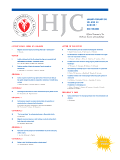
Hellenic Journal of Cardiology
Advancing Cardiovascular Knowledge for a Healthier TomorrowThe Hellenic Journal of Cardiology, a peer-reviewed open-access publication under the esteemed ELSEVIER banner, proudly represents the forefront of research in the field of Cardiology and Cardiovascular Medicine. Established in 1993 and actively publishing since then, this journal has carved a niche in disseminating high-quality research and clinical insights relevant to cardiovascular health in Greece and beyond. With an impressive Q2 ranking in both Cardiology and Cardiovascular Medicine categories as of 2023, the journal holds a commendable position at Rank #126/387 in Scopus, indicative of its critical role in advancing scientific knowledge and practice. The Hellenic Journal of Cardiology transitioned to open access in 2016, ensuring that ground-breaking research is freely accessible, fostering a global dialogue among researchers, clinicians, and students alike. Its publication frequency spans significant years, providing a continuous flow of innovative findings while addressing pressing cardiovascular issues. As the journal builds on its legacy, it aspires to enrich the academic community's understanding of cardiovascular medicine, making it an invaluable resource for anyone invested in heart health.

Revista de la Federacion Argentina de Cardiologia
Fostering collaboration to enhance cardiovascular care.Revista de la Federacion Argentina de Cardiologia is a vital publication in the field of Cardiology and Cardiovascular Medicine, providing a platform for researchers and healthcare professionals to share significant findings and innovative concepts since its inception in 2012. Published by the Federacion Argentina Cardiology, this journal specifically addresses contemporary issues and advancements within cardiology, contributing to the scholarly dialogue essential for improving cardiovascular health. Despite being categorized in the Q4 quartile for 2023 and presently ranking #358 out of 387 in its field, the journal remains committed to fostering academic inquiry and disseminating valuable research for both local and global audiences. Although it is not an open-access journal, it strives to balance accessibility with rigorous academic standards, ensuring quality contributions that are critical for practitioners and students alike. The journal’s ongoing evaluation and adaptation in the ever-evolving landscape of cardiology underscore its importance in advancing cardiovascular science and practice.
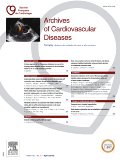
Archives of Cardiovascular Diseases
Transforming the future of cardiology with innovative insights.The Archives of Cardiovascular Diseases, published by Elsevier Masson, stands as a leading journal in the field of cardiology and cardiovascular medicine, with an impressive impact factor that underscores its relevance and influence. This esteemed journal, recognized in the Q2 category for both cardiology and miscellaneous medicine, aims to disseminate groundbreaking research, innovative methodologies, and clinical advancements that can shape the future of cardiovascular health. With its diverse array of open access options, researchers and students alike have the ability to engage with high-quality content, ensuring that cutting-edge findings are accessible globally. Since its inception in 2008, the journal has actively contributed to the advancement of knowledge in cardiovascular diseases, fostering collaboration among clinicians, researchers, and educators. Headquartered in Paris, France, Archives of Cardiovascular Diseases remains committed to enhancing our understanding of cardiovascular health and improving patient outcomes worldwide.
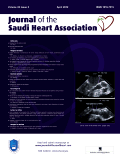
Journal of the Saudi Heart Association
Championing Open Access to Cardiovascular ResearchThe Journal of the Saudi Heart Association is a prominent scholarly publication dedicated to advancing knowledge in the fields of cardiology and cardiovascular medicine. Published by DIGITAL COMMONS BEPRESS, this open-access journal has been serving the global community since 2009, providing a vital platform for researchers, practitioners, and students interested in the latest developments in heart health and disease management. With an ISSN of 1016-7315 and a growing repository of knowledge alongside an E-ISSN of 2212-5043, the journal showcases an array of peer-reviewed articles that contribute to the understanding of cardiovascular conditions. Although categorized in the Q4 quartile for 2023, it remains committed to offering valuable insights, particularly within the constraints of the 29th percentile rank specified by Scopus. As the journal converges towards 2024, it continues to foster collaboration, innovation, and inquiry within the Saudi Arabian and international medical communities.
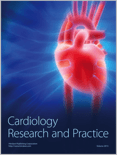
Cardiology Research and Practice
Innovative insights shaping the future of cardiology.Cardiology Research and Practice is a leading academic journal dedicated to advancing knowledge in the fields of cardiology and cardiovascular medicine. Published by HINDAWI LTD, this journal has been an inclusive platform for open access research since 2009, facilitating the dissemination of high-quality studies that contribute to the global scientific community. With an impact factor placing it in Q2 of its category in 2023, it underscores its importance in delivering innovative insights and discoveries that shape clinical practices and policies. The journal covers a broad scope of topics including, but not limited to, cardiovascular disease prevention, innovative treatment modalities, and emerging technologies, appealing to researchers, healthcare professionals, and students alike. Located in the United States with its international reach, Cardiology Research and Practice serves as a critical resource for those dedicated to improving patient outcomes and advancing the field of cardiology.

Cardiology Journal
Elevating standards in heart health scholarship.Cardiology Journal, published by VIA MEDICA, stands as a prominent resource in the field of cardiology and cardiovascular medicine, with an ISSN of 1897-5593 and an E-ISSN of 1898-018X. Recognized for its Open Access model established since 1994, this journal facilitates widespread dissemination of critical research findings, allowing practitioners and researchers globally to access valuable insights without barriers. Based in Poland, with an address at UL SWIETOKRZYSKA 73, 80-180 GDANSK, it has achieved a respectable Q2 classification in 2023 for both Cardiology and Miscellaneous Medicine categories, reflecting its influence and quality within the scholarly community. With a Scopus ranking placing it at #117 out of 387 in Cardiology, it lies within the 69th percentile, underpinning its commitment to advancing knowledge in cardiovascular health. The journal’s converged years extending from 2006 to 2024 ensure it captures ongoing developments in a rapidly evolving field. As such, the Cardiology Journal serves as an indispensable platform for researchers, professionals, and students dedicated to exploring the frontiers of cardiac science and improving patient care.